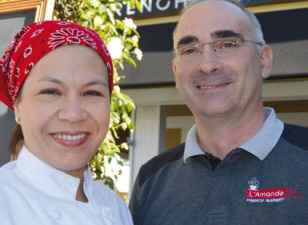Monthly Archives: September 2015
Emil Guillermo: L’Amande Bakery case–Filipino workers’ claims jump to more than $15 million.
The case involving Analiza Moitinho de Almeida, her husband Goncalo, and her powerful father Juan B. Santos, the head of the Social Security System in the Philippines got more interesting late last week.
The court docs were filed last Friday in Los Angeles that ups the total damages and costs sought by workers to $15.2 million.
The court is presuming the bakery owner defendants, the Almeidas, have fled the country. As a consequence, the court directed the plaintiffs to file for a default judgment.
Sources tell me that Almeidas have completed the sale of their home in L.A. worth more than a million dollars this month.
Are they hiding assets? The Almeidas say no.
It’s unclear, however, if the profits are totally out of reach of the court if a judgment is awarded to the 11 former employees suing the Almeidas
My story here in the Philippines’ top daily.
Emil Guillermo: Pope’s U.N. speech takeaways– misuse of environment leads to inequality and exploitation that leads to human trafficking, drugs, terrorism, international crime. “We need to ensure that our institutions are truly effective in the struggle against all these scourges.”
At the UN, the Pope linked misuse of environment to “process of exclusion” of weak and the disadvantaged. He called it part of our “growing culture of waste,” a situation of “exclusion and inequality” with “baneful consequences: human trafficking, the marketing of human organs and tissues, the sexual exploitation of boys and girls, slave labor, including prostitution, the drug and weapons trade, terrorism, and international organized crime.”
Of course, directed at world leaders who give in to greedy corporate development initiatives.
But Pope made me feel guilty for being an infrequent recycler and a non-composter.
Appealed to leaders to “ensure that our institutions are truly effective in the struggle against all these scourges.”
To do that, people must be allowed to be “dignified agents of their own destiny.” Education. For girls too, he said. And at absolute minimum, social development to support a family required “lodging, labor, and land; and one spiritual name, spiritual freedom, which includes religious freedom, the right to education and other civil rights.”
And he linked it all back, to the ecological crisis which can threaten the human species.
Complex speech because of multiple audiences of varying means.
But the church isn’t t called catholic for nothing. The pope is delivering a universal message, that correcting the world’s ills is going to take real action, and not just prayer.
Emil Guillermo: Pope gets long :15 second applause in New York when he thanks religious women, the sisters and mothers….
But imagine what would happen if he really went radical and suggested that the women he thanked could be seen as equals to ordained priests?
Maybe he’s saving that for his second trip to America.
I’m still getting over the Pope’s Congressional speech and his reference to Dorothy Day of the Catholic worker movement, and Thomas Merton.
It indicates he’s serious about social justice by holding up Day as an example. And that he’s also hoping for more the openness and dialogue by pointing to Merton.
And delivering it all is the Pope in his soft spoken voice, alluring to all. There’s no “capitalism is the dung of the devil” rhetoric like he used in South America. But the message in the U.S. is both critical and loving at the same time.
Like a good, grandfatherly pastor. We sit back and listen with respect. And take it all to heart. And maybe going forward, we act.


